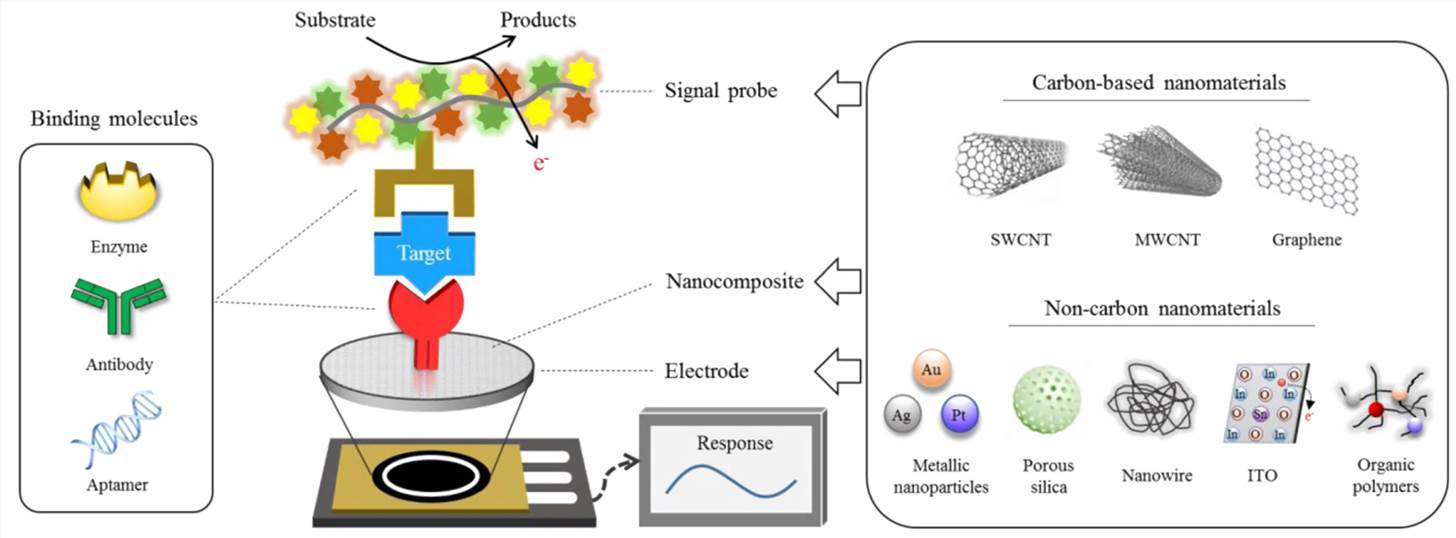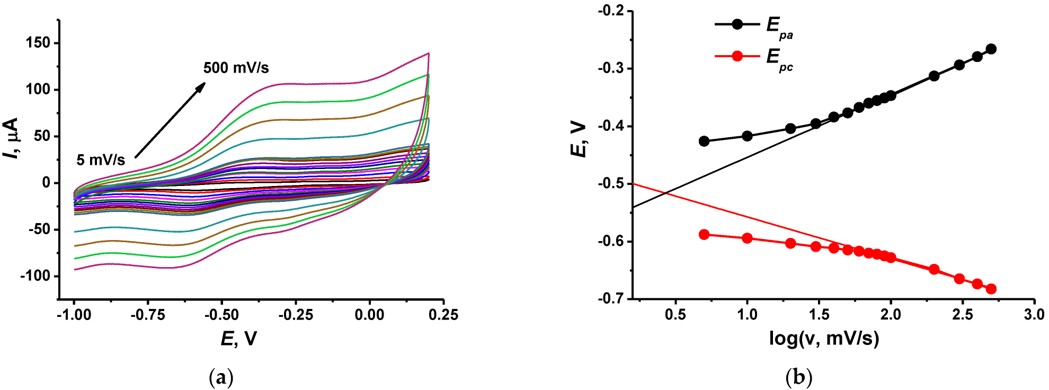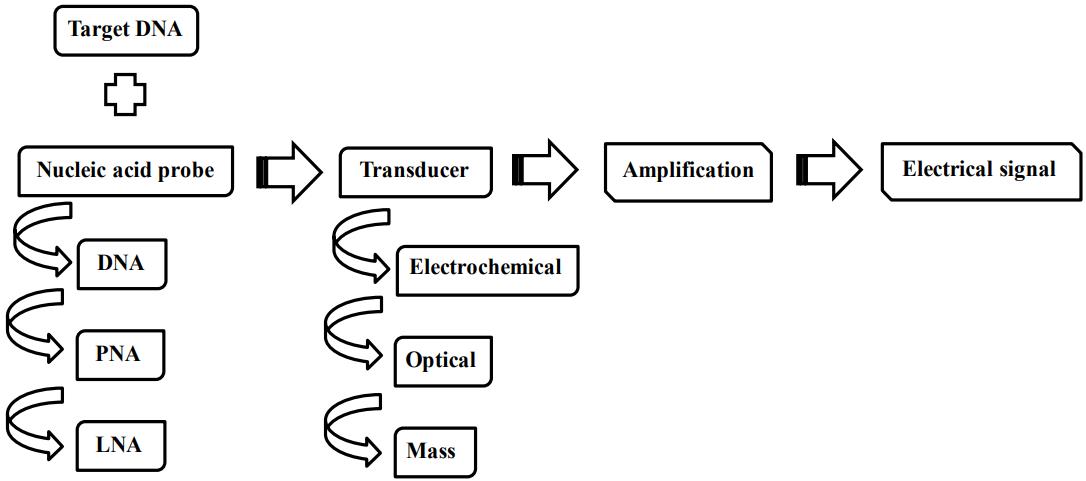Today’s situation in in vitro diagnostics requires accurate and rapid analysis. Electrochemical biosensor combines the sensitivity of electroanalytical methods with the inherent bio-selectivity of the biological component. As a trusted biosensor research company, Creative Biolabs offers precise design, processing and extensive electrochemical biosensor development services. We are your committed partner in combining electrochemical biosensor development with biomolecules detection.
Electrochemical Biosensor Introduction
The electrochemical biosensor is one of the typical sensing devices based on transducing the biochemical events to electrical signals. Flexible electrochemical biosensors play an important role in disease diagnosis. They have various advantages over existing biosensors, such as miniaturization, real-time monitoring, and the enhancement of selectivity and sensitivity. Based on the nature of the biological modification, electrochemical biosensors can be classified as either affinity or biocatalytic sensors. Affinity sensors have a binding recognition element that releases a signal when it is coupled to the target such as antibodies. Biocatalytic sensors are modified with biological elements able to recognize a target and induce a response of an electroactive molecule such as enzymes.
 Fig.1 Scheme of analytical principle for electrochemical biosensors.1, 2
Fig.1 Scheme of analytical principle for electrochemical biosensors.1, 2
Application of Electrochemical Biosensors
Electrochemical methods used in detection field can be classified as potentiometric, amperometric, conductometric, impedimetric, and ion-charge / field-effect. One of the main uses is to directly monitor analytes or the biological activity related to the analyte production or consumption. To date, electrochemical biosensors have enabled sample preparation-free detection of pathogens in various matrices, in situ detection of pathogens on surfaces, rapid pathogen detection using low-cost platforms, multiplexed detection of pathogens in practical matrices, and detection of pathogens via wireless actuation and data acquisition formats. Besides, numerous electrochemical biosensors have been developed and proposed for detection of various diseases such as infectious disease, genetic diseases and cancers based on specific biomarkers.
WE ENABLE YOUR INNOVATION
Creative Biolabs specializes in the design of electrochemical sensors, including Ion Selective Electrodes (ISE), utilizing precision printing or ablated circuitry coupled with the precise deposition of a reagent to impart specificity based on voltametric, potentiometric and conductometric parameters. We are committed to transforming the theoretical advantages of electrochemical biosensors into reality in the field of diagnosis. Our featured services include but not limited to the following:
- Development of Electrochemical Biosensor
- Electrochemical Biosensor for Disease Detection
- Electrochemical DNA Biosensors for the Detection of DNA Damage
Serving a wide variety of industries, our team of scientists and engineers quickly transform electrochemical sensor concepts into viable prototypes. As a uniquely biosensor and IVD research company, Creative Biolabs follows up with scalable manufacturing to deliver finished products that are reliable, easy-to-use and highly cost-effective. If you are interested in our electrochemical biosensor development or detection services, please feel free to contact us for more information.
Published Data
1. A Novel Polymer Composite-Based Electrochemical DNA Sensor
 Fig.2 Electrochemical characterization of the electrode modification.3,2
Fig.2 Electrochemical characterization of the electrode modification.3,2
This study presented a novel electrochemical DNA sensor for the analysis of antitumor drugs. The sensor was created by dispersing carbon black in dimethylformamide (DMF) and applying it to a glassy carbon electrode. Pillar arene was subsequently adsorbed, and then Methylene blue and Neutral red were electropolymerized onto the carbon black layer. To enhance the sensitivity for intercalator detection, DNA was mixed with water-soluble thiacalixarene containing quaternary ammonium groups at the lower rim. The deposition of this mixture onto the electropolymerized dyes enabled the detection of a chemotherapy drug as a model intercalator, with redox activity suppression of the polymerization products. The sensor successfully detected the chemotherapy drug in the range of 0.5 pM–1.0 nM (limit of detection: 0.13 pM) with a 20-minute incubation. It was successfully tested on spiked human plasma samples and chemotherapy drug medications.
2. A Disposable Electrochemical DNA Sensor Using Screen-Printed Gold Electrode Modified with A Nanocomposite
 Fig.3 Working illustration of the DNA affinity biosensor.4
Fig.3 Working illustration of the DNA affinity biosensor.4
This research developed a sensitive, cost-effective, fast-response, and accurate electrochemical DNA biosensor using a disposable screen-printed gold electrode (SPGE) modified with a polyaniline-graphene-silver (PANI-Grap-Ag) nanocomposite for DNA hybridization detection. The biosensor, utilizing a DNA probe labeled with methylene blue (MB) as a redox hybridization indicator, was immobilized on the nanocomposite-modified electrode to hybridize with complementary target DNA. Energy-dispersive X-ray spectroscopy, scanning electron microscopy, and cyclic voltammetry were utilized to characterize the modified SPGE. Differential pulse voltammetry (DPV) was utilized to monitor the current signal during DNA hybridization. The sensor exhibited a strong current response for target DNA detection in the concentration range of 1.0 × 10-11 to 1.0 × 10-11 M. Additionally, the genosensor was easily regenerated and reusable up to 36 times for hybridization studies.
References
- Cho, Il-Hoon, Dong Hyung Kim, and Sangsoo Park. "Electrochemical biosensors: Perspective on functional nanomaterials for on-site analysis." Biomaterials research 24.1 (2020): 6.
- Distributed under Open Access license CC BY 4.0, without modification.
- Kappo, Dominica, et al. "Electrochemical DNA sensor based on carbon black—poly (Methylene blue)—poly (Neutral red) composite." Biosensors 12.5 (2022): 329.
- Thipmanee, Orawan. "A disposable and cost-effective electrochemical DNA sensor using nanocomposite modified screen-printed gold electrode." Journal of Physics: Conference Series. Vol. 1835. No. 1. IOP Publishing, 2021. Distributed under Open Access license CC BY 3.0, without modification.
For Research Use Only.